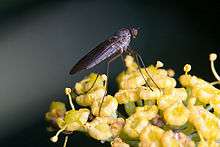Empidoidea
| Empidoidea | |
|---|---|
 | |
| Empis tessellata | |
| Scientific classification | |
| Kingdom: | Animalia |
| Phylum: | Arthropoda |
| Class: | Insecta |
| Order: | Diptera |
| Suborder: | Brachycera |
| Infraorder: | Asilomorpha |
| Superfamily: | Empidoidea |
| Families | |
|
4, see text | |
The Empidoidea are a large monophyletic superfamily of true flies, the sister taxon to the Muscomorpha (= "Cyclorrhapha"). These two groups are sometimes united in the unranked taxon Eremoneura. There are some 10,000 known species in the Empidoidea.[1]
The majority of these insects are predatory, often with large compound eyes (sometimes covering almost the entire surface of the head), and tend to be associated with moist, temperate habitats. Many have a well-developed anal lobe in the wings, and/or a small but distinct anal cell.
Systematics

The most familiar families in the group are the Empididae and Dolichopodidae, both of which occur worldwide and contain thousands of species. The smaller families were formerly included in the Empididae, but have since been accorded family status.[2] The Brachystomatinae and Microphorinae are sometimes elevated to full family status, too, but this would apparently make the Empididae and Dolichopodidae paraphyletic and thus they are retained as subfamilies here.
The present systematic treatment seems to essentially reflect phylogeny rather well; some of the more basal taxa in each lineage are of more uncertain position in cladistic analyses, but at least as an interim solution, the four-family approach seems most warranted. Arranged in phylogenetic sequence, the families are:[1]
- Atelestidae
- Hybotidae – dance flies
- Dolichopodidae – long-legged flies (including Microphoridae)
- Empididae – dagger flies and balloon flies (including Brachystomatidae)
Footnotes
References
- Moulton, J.K. & Wiegmann, B.M. (2007): The phylogenetic relationships of flies in the superfamily Empidoidea (Insecta: Diptera). Mol. Phylogenet. Evol. 43(3): 701-713. doi:10.1016/j.ympev.2007.02.029 PMID 17468014 (HTML abstract)
- Sinclair, B.J. & Cumming, J.M. (2006): The morphology, higher-level phylogeny and classification of the Empidoidea (Diptera). Zootaxa 1180: 1-172. PDF fulltext